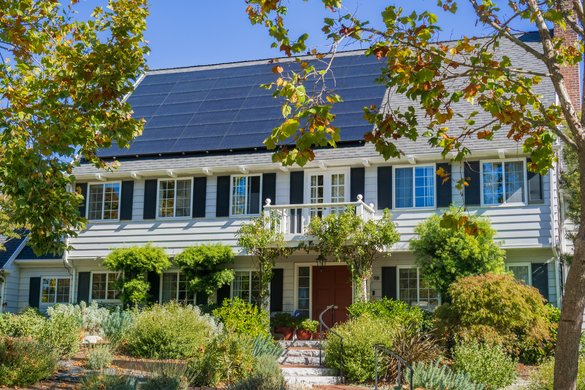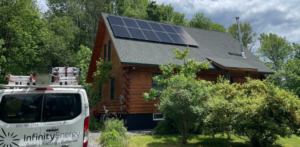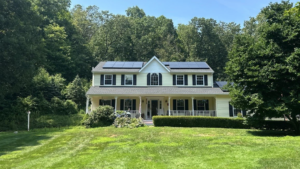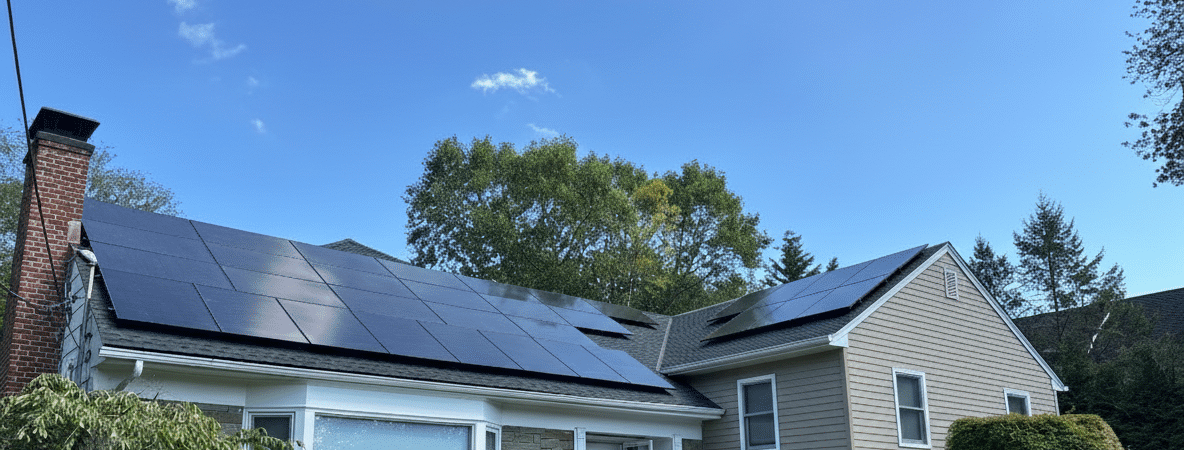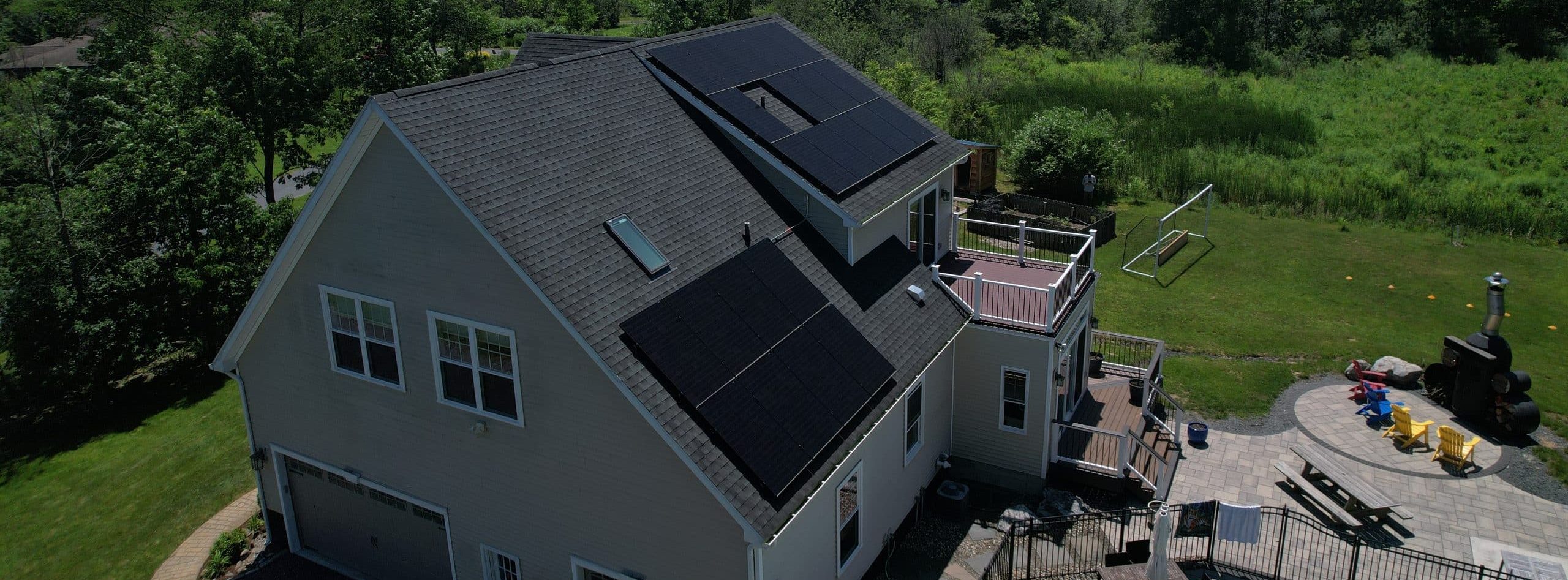There are several guidelines to follow when leasing solar panels in NJ. According to recent studies, rooftop solar system prices have fallen over 40% in New Jersey over the last five years. Largely, this is because of how fast solar demand is growing across the state. Even as prices continue to decrease and incentive programs offer savings options, solar panel systems are a large investment. As a homeowner in the market for solar, you need to understand how to lease your panel system. Indeed, leasing is a great financing option to manage your monthly payments. Read on to learn about the most important guidelines to leasing solar panels in NJ.
How to Determine if a Solar Lease is Right for You
Deciding whether a solar lease is suitable for you involves careful consideration of several factors. Here’s how you can assess your options:
- Assess Your Eligibility for Incentives
First, check if you qualify for local incentives. These benefits can significantly reduce the upfront cost of purchasing solar panels. If you don’t qualify, a solar lease might become more appealing since it avoids high initial expenses. - Understand Your Financing Options
Look into solar loan options. Some lenders offer favorable terms that can make buying a solar power system more cost-effective than leasing. Compare these terms to leasing options to see which makes more financial sense in the long run. - Get Multiple Quotes
Contact several local solar installers for quotes on both leasing and purchasing options. This will give you a clear picture of the potential savings and costs associated with each choice. Understanding the breakdown of these costs will help you decide if leasing aligns with your financial goals. - Evaluate Longevity and Homeownership Plans
Consider how long you plan to stay in your home. Solar leases often have long-term contracts, and if you plan to sell your home soon, a lease agreement could complicate the process or limit your ability to sell quickly. - Review the Terms and Conditions
Carefully read the fine print in any solar lease agreement. Understand the terms regarding maintenance, potential rate increases, and what happens at the end of the lease period. Knowing these details will help you make an informed decision.
By thoroughly evaluating these aspects, homeowners can determine whether a solar lease is the most beneficial option for their unique situation.
Understanding the Financial Implications of Solar Leases
When considering solar leases, it’s essential to weigh both the immediate financial benefits and the long-term financial impacts. Here’s an in-depth look into what this means for you:
Monthly Payments Simplified
Opting for a solar lease allows homeowners to harness solar energy without the initial expense of installation. Instead, you make a predictable monthly payment to a solar company. This payment is typically structured to be less than your traditional electricity bill, providing some relief from the get-go.
However, it’s important to note that unlike a Solar Power Purchase Agreement (PPA), where payments fluctuate based on actual energy production, solar lease payments remain constant. This means you’ll pay the same amount every month regardless of the actual energy your panels generate.
Is a Solar Lease Worth It for Homeowners?
Deciding whether a solar lease is the right choice for your home involves weighing several factors. Here’s a closer look at the considerations to help you make an informed decision.
When a Solar Lease May Be Advantageous
A solar lease can be beneficial if you’re unable to secure a solar loan. In these scenarios, a lease offers an accessible way to enjoy the benefits of solar energy without hefty upfront expenses.
Optimal Financing with a Solar Loan
For homeowners who can’t afford a cash purchase, a solar loan typically provides the best financing route. This option allows you to reap all the advantages of solar power, such as reduced electricity bills and embracing renewable energy, while sidestepping the initial costs.
Comparison Shopping: A Smart First Step
Before finalizing any decision on a solar lease, it’s wise to gather multiple quotes from local installers. Engaging with various providers not only helps you secure competitive pricing on your solar system but also gives you a clearer perspective on whether a lease aligns with your specific needs.
Key Takeaways:
- Eligibility Matters: A lease might be your best bet when you don’t qualify for tax benefits or loans.
- Loans Over Leases: When possible, a solar loan often offers better financial benefits.
- Get Multiple Quotes: Diverse quotes are essential to assess the true merit of a lease for your home.
In essence, while a solar lease can be a viable option under certain circumstances, exploring all available financing paths will ensure you make the most informed choice for your solar investment.
What Are the Maintenance Responsibilities Under a Solar Lease?
When you opt for a solar lease, your maintenance duties are minimal. This arrangement might seem advantageous, but let’s break down its true value.
Minimal Routine Care:
Typically, solar systems are very low maintenance. The primary task involves cleaning the panels around four times a year with nothing more than a garden hose. This helps ensure maximum efficiency by keeping dirt and debris from obstructing sunlight.
Covered by Warranty:
In the case of more significant issues like faulty wiring or inverter malfunctions, these are generally covered by the warranties provided by the manufacturer or the installer. So, there’s little need for concern on this front.
Damage Protection:
If your system sustains damage due to weather events or unforeseen circumstances, your homeowner’s insurance often steps in to cover these repairs. With a solar lease, you are typically insulated from the direct cost implications of such occurrences.
Summary:
While leasing relieves you of directly managing these responsibilities, you would have similar protections even with outright ownership. Whether you lease or buy, solar systems are designed to be user-friendly with minimal upkeep required.
When Might a Solar Lease Be the Best Choice for a Homeowner?
Opting for a solar lease can be advantageous under certain circumstances. If you’re exploring solar energy options, here’s when a solar lease might be your best bet:
1. Lack of Financing Options
- If securing a solar loan isn’t feasible due to a low credit score or other financial barriers, a lease provides an accessible alternative with little to no upfront costs.
2. Minimal Upfront Investment
- Leases typically require no down payment, making them ideal for individuals who want to avoid large initial expenses.
3. Maintenance and Repairs Included
- Leasing often includes maintenance and repairs, meaning homeowners can enjoy peace of mind without worrying about unexpected expenses.
4. Shorter-Term Commitment
- For those planning to move before breaking even on a solar purchase, a lease can offer a flexible, short-term energy solution.
Keep in mind that while a solar lease can bring these benefits, it’s important to evaluate your long-term energy goals and financial situation thoroughly. Balancing these factors will ensure you make an informed decision that aligns with your needs.
What is a Solar Lease and How Does It Work?
A solar lease is an agreement where you pay a fixed monthly fee to use solar panels installed on your property without owning them. Comparable to leasing a car, this arrangement allows you to benefit from solar energy while avoiding the upfront costs of purchasing the equipment.
Understanding How a Solar Lease Operates
- Installation: A solar installer collaborates with a leasing company to set up the solar panels on your property. The installer handles everything from the design to maintenance, ensuring the system runs efficiently.
- Energy Usage: Once the system is operational, it generates solar power that your home uses instead of electricity from the traditional grid. This shift cuts down your dependence on utilities and decreases your electric bill.
- Financial Benefits: The savings arise because you’re substituting your electricity costs with often lower monthly lease payments. For instance, if your utility bill was $150 and your solar lease is $100, you save $50 monthly.
Key Considerations
- Potential Extra Costs: Solar production may not always cover your entire energy usage. Factors like fewer sunny days or increased electricity usage might force you to draw from the grid, resulting in a residual utility bill along with your solar lease payment.
- Financial Return: The main advantage is the potential savings compared to your previous utility expenses, making it economical in the long run.
By opting for a solar lease, you can access renewable energy advantages without the high initial investment, all while potentially reducing your energy expenses over time.
Transferring Solar Lease Agreements When Selling Your Home
When selling your home, you might wonder if you can transfer your solar lease agreement to the new homeowner. The good news is that, in many cases, it is indeed possible to transfer these agreements.
How It Works:
- Review the Lease Agreement: Start by checking the terms of your current solar lease. Most agreements contain specific clauses regarding transfers.
- Contact the Solar Company: It’s crucial to inform your solar provider of your intention to sell. They will guide you through the process and explain any necessary steps.
- Qualifying the Buyer: The new homeowner might need to meet certain credit or financial criteria to assume the lease. This ensures they can continue making payments.
- Agreement Transfer: Once the new homeowner is approved, the solar company will facilitate the transfer of the lease into their name.
Considerations:
- Flexible Options: Some solar companies may offer alternative solutions, such as buying out the lease before the transfer or removing the solar panels entirely.
- Impact on Home Sale: Highlighting the cost-saving benefits of solar panels can be an attractive selling point, potentially increasing the value of your home.
Transferring a solar lease is often straightforward, facilitating a smoother home sale and transition for both parties. Ensure clear communication with the solar provider and the prospective buyer to successfully navigate the process.
Deciding on a Solar Lease: Key Considerations for Homeowners
When you’re contemplating solar energy for your home, the concept of “free solar panels” can be enticing. However, before committing to a solar lease, it’s crucial to evaluate whether this approach aligns with your financial and energy consumption goals.
Financial Flexibility
- Alternative Financing: Explore solar loans as they often offer advantages such as lower overall costs and ownership of the system. Loans can help you gain electric bill savings and allow you to utilize renewable energy without large upfront expenses.
Cost Comparison
Gather quotes from several local solar companies. This strategy will assist you in understanding the full scope of options, including outright purchases and loans, in addition to leases. Comparing offers ensures you don’t end up paying more than necessary over the lease term.
Long-term Implications
- Savings and Efficiency: Assess the long-term financial benefits of leasing solar panels. While leasing can require little to no initial investment, the cumulative costs over time can outweigh the benefits compared to ownership through purchasing.
- Home Value and Selling: Consider how a solar lease could impact your home’s resale value. Some potential buyers may prefer a home with owned solar systems instead of leased ones, potentially affecting marketability.
Maintenance and Upkeep
Leasing might relieve you of maintenance responsibilities, as the leasing company often retains ownership and handles servicing. Determine if this convenience justifies the potential extra costs over the lease period.
By thoroughly considering these factors, homeowners can make an informed decision on whether a solar lease is genuinely the best choice for their situation.
How Do Solar Leases Impact the Resale Value of a Home?
When considering the effect of solar leases on home resale value, it’s crucial to note that these arrangements often don’t enhance your property’s worth. In fact, they can present challenges during the selling process.
- Lease Agreements Overload: Buyers may hesitate to adopt a lease based on your previous energy consumption patterns. This disparity can turn potential buyers away, as it complicates their understanding of future costs.
- Misunderstood Concepts: Many prospective homeowners may not fully grasp the concept of a solar lease. This lack of familiarity can deter them from proceeding with a purchase, especially if they prefer straightforward property investments without additional contracts.
Solar leases can therefore be double-edged; while providing energy savings, they might also shrink your potential buyer pool and make selling your home more complex.
Final Considerations for Solar Leases in New Jersey:
Assess Terms
In addition, it is essential to assess your terms when deciding whether to lease your NJ solar panels. With a solar lease, you usually make monthly payments for 20 or 25 years depending on your solar power providers in New Jersey. Once the lease is up, you can usually renew your agreement or buy the system outright if you would like to own your panels. On the other hand, solar loans can last 5, 10, or 15 years depending on your financial preferences. Once you’ve made all of your agreed payments, you own your system. With a solar loan, you typically incur an interest rate. Typically, this is anywhere from 3 to 8%. Usually, this depends on a variety of factors, including your credit score and the length of your loan. When deciding whether to lease your solar panels New Jersey, assess the terms of various installation agreements.
Incentive Eligibility & Approval Timelines
Furthermore, it is essential to know your incentive eligibility and approval timeline when leasing your rooftop solar system in NJ. When you lease your panels, your solar company usually owns the TRECs your panels generate. Under a lease, you are not eligible for the solar ITC extension as well. Thus, a solar loan may be a better option if you were looking to take advantage of these incentive programs. On the other hand, a solar lease often offers a much shorter approval process. Typically, you can get it signed in a single meeting with your installer. Loan agreements can take several weeks to get approval. If you’re looking to start your solar project right away, leasing your NJ solar panels is the best option.
How Do Price Escalators Affect Solar Lease Payments Over Time?
When considering a solar lease, it’s important to understand the role of price escalators. These escalators are built into most solar lease agreements and can have a significant impact on your payments over time.
What Are Price Escalators?
Price escalators are annual increases in your solar lease payments designed to mirror potential rises in electricity costs. Typically, these escalators range from 1% to 5% each year.
How Do They Affect You?
- Yearly Payment Increase: If your initial solar lease payment is $100, and there’s a 2% escalator, your payment will rise to $102 in the second year. This increase will continue annually.
- Comparison to Market Prices: Ideally, the escalator keeps your solar payments competitive or lower than your utility’s electricity rates. However, if electricity prices don’t rise as expected, you might find your solar lease becomes more expensive than paying traditional electricity bills.
Key Considerations
- Budgeting: When you plan your finances, anticipate these annual increases. Even a small percentage can significantly affect long-term costs.
- Market Conditions: Monitoring electricity rates and market trends can help you decide if a solar lease is still advantageous for you.
In essence, price escalators ensure that your solar lease payments align with potential electricity cost increases, but they also require careful consideration to avoid unexpected expenses.
There are several guidelines to follow when leasing solar panels in NJ. First, you need to understand how each financing option operates. Next, assess your leasing option terms. In addition, solar maintenance can differ slightly between financing options. Moreover, you need to know your incentive eligibility and approval times. Consider these points for a homeowner’s considering leasing solar panels in NJ.
